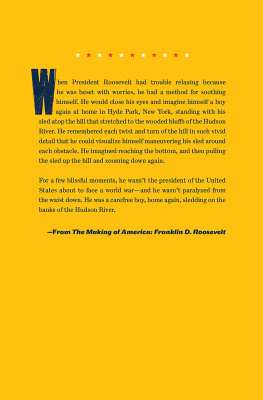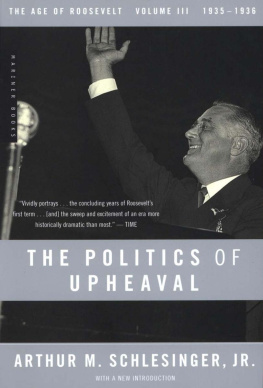The Pink Lady
Passion and Principle
Faith and Betrayal
American Massacre
The Money and the Power (with Roger Morris)
The Bluegrass Conspiracy

Copyright 2012 by Sally Denton
Published by Bloomsbury Press, New York
First U.S. Edition 2012
Electronic edition published in January 2012
All rights reserved. No part of this book may be reproduced or transmitted in any form or by any means, electronic or mechanical, including photocopying, recording, or by any information storage and retrieval system, without permission in writing from the publisher.
For information address Bloomsbury Press, 175 Fifth Avenue, New York, NY 10010.
LIBRARY OF CONGRESS CATALOGING-IN-PUBLICATION DATA
Denton, Sally.
The plots against the president : FDR, a nation in crisis, and the rise of the American right / Sally Denton. 1st U.S. ed.
p. cm.
Includes bibliographical references and index.
eISBN 978-1-60819-359-2
1. United StatesPolitics and government19331945. 2. Roosevelt, Franklin D. (Franklin Delano), 18821945. 3. Roosevelt, Franklin D. (Franklin Delano), 18821945Adversaries. 4. ConservatismUnited StatesHistory20th century. 5. New Deal, 19331939. 6. Depressions1929United States. I. Title.
E806.D465 2012
973.917092dc23
2011023857
For my mother and father
In easy times history is more or less of an ornamental art, but in times of danger we need to know what kind of firm ground other men have found to stand on.
JOHN DOS PASSOS, THE THEME IS FREEDOM
Contents
Prologue:
Part One:
Part Two:
Epilogue:
Prologue
When dawn broke in Washington, D.C., on Saturday, March 4, 1933, the atmosphere was celebratory, if anxious. Slate gray and ominous, the sky suggested a calm before the storm. Even before the sun rose, more than a hundred thousand people had gathered on the east side of the Capitol. General Douglas MacArthur was in command of the inaugural parade, and he habitually expected the worst. By that morning, American depositors had transferred more than $1.3 billion in gold to foreign accounts, millions of people had been turned away from their banks, and rioting was expected in cities throughout the nation, prompting some state governors to predict a violent revolution.
Army machine guns and sharpshooters were placed at strategic locations along the route. Not since the Civil War had Washington been so fortified. Journalist Arthur Krock likened the climate to that which might be found in a beleaguered capital in wartime. Armed police guarded federal buildings, and rumors swirled that Roosevelt was going to appropriate dictatorial powers and impose martial law. But if he had ever really entertained such a notionas unused drafts of an inaugural address indicatedhe abandoned it. Despite efforts made by William Randolph Hearst, Walter Lippmann, Bernard Baruch, and others to convince him of the necessity for a benevolent despot to seize control of the country, Franklin Delano Roosevelt was unswayed.
Hearst, the nations most powerful publisher, went so far as to produce a Hollywood movie Gabriel Over the White House , starring Walter Hustonto instruct both Roosevelt and the American public how to succumb to dictatorship. Even though Italys Benito Mussolini and Fascism were enormously popular and highly regarded in America at the time, Roosevelt distrusted autocracy, did not believe that one could count on a benevolent dictator to remain so, and, especially, maintained an absolute commitment to the U.S. Constitution. We could have had a dictator and we would have had one but for the President himself, to whom the whole idea was hateful, a U.S. Army general later said in a speech at the Waldorf-Astoria Hotel in New York. Instead, Roosevelt determined to incite the public to action rather than to capture extra-constitutional authority for himself. He wanted not to assume enhanced powers, not to take advantage of a quavering nation to elevate his own stature, but rather to ignite the citizenry to banish apathy and recapture a spirit of confidence and achievement. He sought not to issue comforting bromidesas his predecessor, Herbert Hoover, had done incessantlybut to raise a battle cry, a call to arms for Americans to overcome their fear and march bravely into the unknown. His overarching message: If they had lost faith in themselves, he would restore it.
But he was not content to stop there. Even as he hoped to inspire and invigorate, he also intended to hold accountable those who had failed the nation and sent it plunging into its abyss. When millions lived close to starvation, and some even had to scavenge for food, bankers and corporation executives drew astronomical salaries and bonuses, as one account described the disparity between the poor and the wealthy. In a profound departure from Hoover, Roosevelt promised not only to bring relief to the victims but also to punish the perpetrators of the catastrophe. He would make clear that the departure of Herbert Hoover signified the end of the old order.
Part One
I have never in my life seen anything more magnificent than Roosevelts calm.
RAYMOND MOLEY, BANK CRISIS, BULLET CRISIS, SATURDAY EVENING POST, JULY 29, 1939
Chapter One
Born January 30, 1882a splendid large baby boy weighing ten poundsFranklin Delano Roosevelt was descended from gentility, if not American aristocracy, on both the maternal and paternal sides. He was the sole issue of the marriage between James Roosevelt and his second wife, Sara Delano, both members of New Yorks oldest and richest families.
James Roosevelt had practiced law with a distinguished Manhattan firm before becoming a financier invested in coal, railroads, and canals, and ultimately a gentleman farmer at Hyde Park, his Hudson River Valley estate. Like the rest of the Oyster Bay branch of his family, which included first cousin Theodore Roosevelt, he lived a life of sailing and fishing, horse breeding and fox hunting, skating and sledding, and a dabbling in politicsfirst with the Whig and then the Democratic Party. His wife Sara was twenty-six years his junior, the daughter of a neighbor and friend, who had been raised in the same rarefied world of the River families. They were married four years after the death of his first wife, and he brought his young bride back past the ivied stone columns and the broad lawns down the long drive through the magnificent trees to his comfortable country house at Hyde Park, as historian and biographer Arthur M. Schlesinger Jr. described the couples return from their monthlong European honeymoon.
For her part, Sara was the offspring of the fabulously moneyed Delanosa French Huguenot clan that had immigrated to America on the Mayflower . Her father, Warren Delano II, had made a fortune in the Chinese tea and opium trades, and she had been raised on an estate in Hong Kong and in a fashionable apartment in Paris. She had attended finishing school in Germany, had vacationed in England and France, and slipped seamlessly into the leisurely lifestyle provided by her new husband.
From the moment her beloved son Franklin was born, Sara Roosevelt defined herself through him. She breast-fed for a year or more, and then continued to bathe Franklin until he was eight years old. Dressing him in Little Lord Fauntleroy costumes and English sailor suits and coiffing his long curls, Sara carried the child all day longin contrast with the parenting style of most women of her social class. There were the requisite governesses and tutors who had served Americas nobility, but Sara took a primary role in educating and shaping the perfect being in her charge. Of keen mind and lively spirit, the good-natured little boy won the hearts of all who interacted with him. Popsy, as he called his father, who had been fifty-four when Franklin was born, taught him to ride, hunt, fish, and sail. His mother read to him constantly and oversaw the exacting and regimented routine by which he would become a disciplined and learned man. Indulged as the only child of wealthy parents, Franklin Roosevelt amassed a valuable stamp collection by the age of nine, owned a pony and a sailboat, had traveled to Europe eight times while under the age of twelve, and spent his summers at the familys comfortable vacation home on Campobello Island, off the Canadian coast in New Brunswick. He was passionate about birds, first collecting their eggs and nests and eventually shooting, stuffing, and mounting them. His most avid interest, which he carried into manhood, was the seaan enthusiasm inspired by his seafaring grandfather Delano, his fathers yachting experiences, and the adventure stories his mother read to him. As a boy, he began collecting a naval history library, ship models, and photographs and prints of vessels.
Next page





